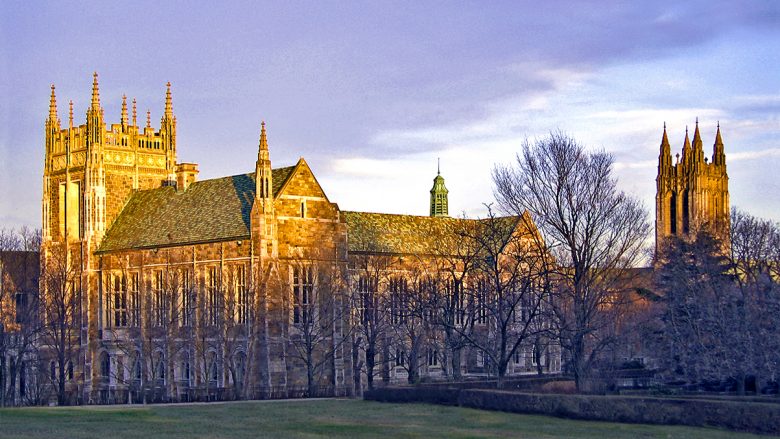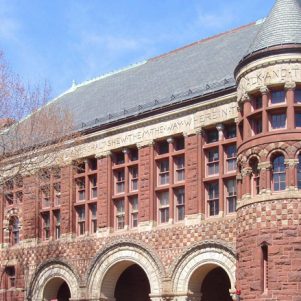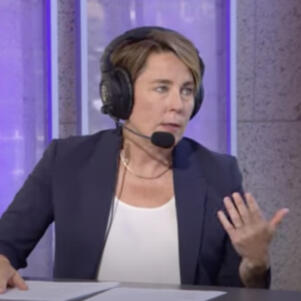Boston College students protest ‘Eurocentric’ requirement
By Derrick Perkins | May 13, 2016, 17:24 EDT
 A picture snapped on the campus of Boston College captures a peaceful moment. (Photo courtesy of Wikipedia.org)
A picture snapped on the campus of Boston College captures a peaceful moment. (Photo courtesy of Wikipedia.org) BOSTON – Boston College’s perceived “Eurocentric” course requirement for graduation has some students up in arms.
Sophomore Elizabeth Waltman is leading the charge, describing the prestigious college’s core courses as falling short of the Jesuit institution’s goal of producing students capable of “constructing a more just and human world.” History requirements are particularly troubling, Waltman wrote in the introduction to an online petition, posted on the Change.org website, that demands a shift of perspective.
“With the addition of core history classes that emphasize the importance of global histories, rather than merely ‘understanding European history and the impact of European institutions on the modern world,’ Boston College will be able to truly accomplish its philosophy,” Waltman wrote. Dozens of people have signed on to the campaign.
The effort, which has garnered attention from campus publications as well as national outlets, grew out of a class assignment, according to The Heights, the BC student newspaper. Theology professor Meghan Sweeney asked students in her “The Challenge of Justice” course with identifying an injustice on campus and addressing it.
The college requires undergraduate students to take 15 courses on various subjects to meet graduation requirements. The courses run the gamut, from mathematics to history to arts. Students can take them in the first years of college or throughout the course of their education.
Among the courses that must be taken to meet the requirements are some that are decidedly “Eurocentric,” like “Modern History I” and its sequel. The course description for both says it covers “the historical development of Europe from the Renaissance to the present, with the intention of explaining how the unique Western society in which we live today came into being.” It goes on to say that the growth of European power and culture makes “the development of Europe a key to understanding the modern world as a whole.”
But other course selections such as “Understanding Race, Gender and Violence,” “Classical Chinese Philosophy,” “States and Minorities in the Middle East” and “Latin American Women Represent Themselves” are among the choices for meeting graduation requirements.
Still, some students who completed Sweeney’s assignment believe more can be done, even after the school added a course on Africa and the African Diaspora to the list of offerings that can be completed to meet graduation requirements starting in the coming academic year.
But it is the history requirement that the students have objected to as too “Eurocentric.”
“We believe that it is an injustice to not give students the choice to learn about other histories they may be interested in,” Riley Kinney, one of the students working on Waltman’s project, told The Heights newspaper.
How to teach history at the high school and college levels has proved a contentious battleground, spilling out occasionally from academic circles and into the mainstream. The focus on Eurocentrism, as in viewing the world from a distinctly European or Western perspective, has been particularly convulsive for decades.
In 1996, Peter Gran, a history professor at Temple University, penned “Beyond Eurocentrism: A New View of Modern World History.” In it, he argued that traditional approaches to teaching history left graduates, including future diplomats and educators, at a disadvantage.
“If today nearly all subjects in history are dominated by social historians, world history remains something of an exception,” Gran wrote. “It continues to be studied in terms of elites, mainly Western elites.”
A more recent example of how students can be misguided cropped up last year in a geography “program” that included a book for high school students from publisher McGraw Hill. It described slaves as “workers from Africa” ferried to the United States to “work on agricultural plantations.” Activists understandably took exception to the wording, decrying it as an attempt to whitewash America’s historic involvement with slavery. McGraw Hill subsequently agreed the wording was wrong and promised to change it.
Boston College officials didn’t respond to requests for comment about the online petition. Attempts to reach Waltman and Sweeney for comment were unsuccessful. But the online petition has garnered more than 80 signatures thus far.
The students’ effort, though, also has attracted the interest of The Gavel, an activist campus publication and the group known as Eradicate Boston College Racism. That organization has agitated for changes in course offerings, including a push for more diversity, according to The Heights.
In a description of courses offered to meet the graduation requirements, the school indicates a new approach is being developed that involves offerings taught by teams that encompass “topics such as the global implications of climate change, genocide and crimes against humanity, the social contexts of violence, and the challenge history and literature face in pursuing truth.” Some entering freshmen were give the option to pursue those studies during the academic year just ending.
If Waltman’s petition reaches 100 signatures, it will end up before a college committee tasked with reviewing graduation requirements, the student newspaper has reported.











